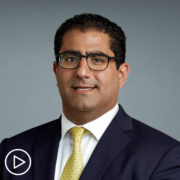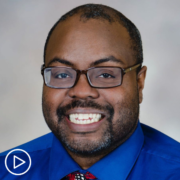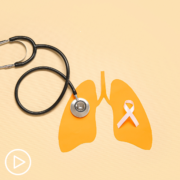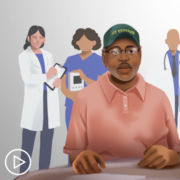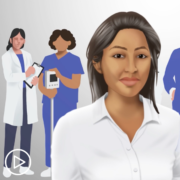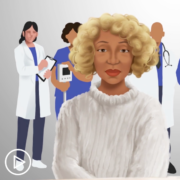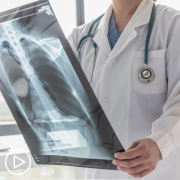HCP Roundtable: Exploring CLL Mutations and Best Practices for Side Effect Management
HCP Roundtable: Exploring CLL Mutations and Best Practices for Side Effect Management from Patient Empowerment Network on Vimeo.
As the chronic lymphocytic leukemia (CLL) treatment landscape evolves, how can healthcare professionals deepen their understanding of mutation profiles, including the emergence of novel CLL mutations over time? What innovative approaches are transforming the management of CLL side effects? Additionally, how can barriers in CLL practice be removed to enhance physician-patient communication and promote shared decision-making?
Dr. Jennifer Brown from the Dana-Farber Cancer Institute and Dr. Callie Coombs from the University of California, Irvine, share their expertise and best practices for CLL healthcare providers.
Download Resource Guide | Descargar guía de recursos
Related Resources:

Peer Insights: Understanding Cultural Competence vs. Cultural Humility |
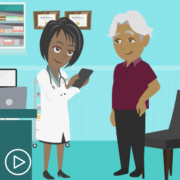
|

Peer Insights: Practicing Cultural Humility to Empower Your Patients |
Transcript:
Dr. Nicole Rochester:
Welcome to this Empowering Providers to Empower Patients or EPEP Program. I’m Dr. Nicole Rochester, founder and CEO of Your GPS Doc. EPEP is a patient empowerment network program that serves as a secure space for healthcare providers to learn techniques for improving physician-patient communication and overcome practice barriers.
In this CLL roundtable, we are tackling exploring CLL mutations and best practices for side effect management. As the chronic lymphocytic leukemia treatment landscape evolves, how do CLL healthcare providers better understand mutation profiles, including the emergence of novel CLL mutations over time? What groundbreaking CLL therapeutic targets are emerging, tailored specifically to molecularly defined patient subgroups? And what innovative approaches are transforming CLL side effect management? These are just some of the things that we’re going to discuss today. We’re going to talk about the complexities of CLL mutations and the clonal evolution and resistance mechanisms in CLL.
We’ll discuss clinical trials and novel targets focused on molecularly defined patient subgroups. And lastly, we’ll talk about strategies for healthcare provider to healthcare provider communication regarding the management of side effects.It’s my privilege to be joined by Dr. Jennifer Brown, Director of the CLL Center of the Division of Hematologic Malignancies at Dana-Farber Cancer Institute, and the Worthington and Margaret Collette Professor of Medicine in the field of Hematologic Oncology at Harvard Medical School. Thank you so much for joining us, Dr. Brown.
Dr. Jennifer Brown:
My pleasure. Thank you for having me.
Dr. Nicole Rochester:
It’s also my privilege to be joined by Dr. Callie Coombs, an Associate Clinical Professor at the University of California, Irvine. Dr. Coombs primary clinical focus is in the care of patients with chronic lymphocytic leukemia and small lymphocytic lymphoma. She has participated in multicenter studies examining the real world implications of novel therapeutic agents on the lives of patients, and has served as an investigator on a number of clinical trials. Thank you so much for joining us, Dr. Coombs.
Dr. Callie Coombs:
Thank you for having me as well.
Dr. Nicole Rochester:
So let’s jump in as we have a lot to discuss as it relates to understanding CLL mutations and best practices for side effect management in CLL. So we’re going to start with the complexities of CLL mutations. And the first question, I’ll start with you, Dr. Brown, how do CLL healthcare providers better understand mutation profiles including the emergence of novel CLL mutations over time?
Dr. Jennifer Brown:
Well, the first thing that’s important to recognize is that CLL is not defined by any particular mutation. The landscape is quite varied and we see a large number of different mutations at low percentages. Well, the second key point to remember is that there are different mutations at baseline and then there can be acquired mutations that include some of what we see at baseline, but also novel resistance mutations that we don’t ever see at base.
So at baseline, the most common mutations, which are somewhere in the 10 to 20 percent range of patients, although less than that if you have very early stage patients, affect the p53 gene, NOTCH1, SF3B1, and ATM. P53 is the most important because that one does influence our thinking about the patients and our choice of therapy in some cases. P53 can be altered in CLL in two different ways. Actually, the most common way is as a deletion, deletion of the short arm of chromosome 17 or 17P deletion. About 75 to 80 percent of patients that have that deletion will have a point mutation usually in the other p53 allele. So they have double knockout of p53.
A small percentage of people with the deletion will not have the mutation. And then a certain number of patients will have just the mutation without the deletion. And one of the things that I’ve been very interested in for a while that we’re still trying to understand better is the implications of these different combinations of the way p53 can be affected in people with CLL, and that it may, in fact, be more adverse to have both alleles knocked out than single, although we don’t have great data for that as yet because most of the data that we have has combined all of it together.
But it’s very important to test for the p53 mutation alone because even if patients have only that one, at present, we consider the treatment implications of it all similarly regardless of how the p53 gene is affected. And then NOTCH1 is a fairly common mutation that always worries us a lot, because it’s associated with Richter’s transformation, which is a very high-risk event, but we don’t know anything to do about that to try and prevent it or to alter our therapy based on it.
So at the moment it’s mostly something that we are aware of that we keep an eye on but not that changes therapy. And SF3B1, ATM, and this long list of other genes that can be mutated in just a few percent of CLL, and mostly what we know about them is some biology that’s been studied, and then the fact that the more of these mutations are mutated in a patient that is associated with a worse prognosis, just a total number.
But that’s not something also that really alters our therapy. And then when patients go through lines of therapy, they can sometimes acquire mutations in these genes. So a patient can acquire a mutation in p53 or in NOTCH after their second or third line of therapy. But the mutations that are hottest right now, or that people are most interested in are some of the mutations that occur as resistance to therapy. So in particular, that means BTK mutations.
Covalent BTK inhibitors have transformed the therapy of CLL, and they bind to the cysteine 481 residue of BTK. So that means, as you might imagine, that if you mutate that cysteine so that the inhibitor can’t bind, that will be associated with resistance. And that, in fact, is what has been found that the cysteine to serine mutation at 481 is the most common resistance mutation in patients on covalent BTK inhibitors.
And in the case of ibrutinib (Imbruvica), it makes the inhibitor into a much weaker and non-covalent inhibitor. In the case of acalabrutinib (Calquence) and zanubrutinib (Brukinsa), it probably abrogates all activity. And so that’s a mutation that we will sometimes look for in patients with clinical progression on those drugs. There’s also a mutation in BCL2 that can occur in patients in venetoclax (Venclexta).
So another example of an on target resistance mutation. The role of that one is a little bit less clear, and testing for it is not as widely available, but we’re still working on that. Resistance to venetoclax is probably more complicated than resistance to BTK inhibitors, although there’s also a subset of patients who will get BTK inhibitors who have novel mechanisms of resistance not related to BTK that we don’t really know anything about as yet.
And then finally, the non-covalent BTK inhibitors are becoming available, pirtobrutinib (Jaypirca) was approved for CLL in the United States in December for patients who’ve had covalent BTK inhibitors and venetoclax. And we’re starting to see different mutations in BTK at different sites, even though pirtobrutinib has activity against the 481 mutation. So there’s going to be a lot of activity in this area in the next few years probably.
Dr. Nicole Rochester:
Thank you so much, Dr. Brown, that was a very comprehensive overview of the mutations. Dr. Coombs, do you have anything that you want to add to what Dr. Brown said perhaps specifically around mutations associated with the progression of CLL?
Dr. Callie Coombs:
Sure. So, that’s a hard act to follow. She really took us through a whirlwind of everything mutation-related. I think what I would like to focus on in my answer is, well, what should we be testing for on a day-to-day basis in our CLL practices and what are some common misconceptions? So specific to TP53, I would say this is the most important test as far as all of the genetic tests that influences what we do day to day in the care of patients with CLL.
I test for this for my newly diagnosed patients who I think may be interested in enrolling in a clinical trial, first of all, so the standard of care in CLL is watch and wait, however, patients with higher risk disease may be eligible for trials looking at early intervention specifically the SWOG EVOLVE trial looking at early treatment. And so that’s one of the risk markers that can get a patient into the higher risk category of CLL where they could be eligible for a trial.
A common misconception I see is that 17p is the same thing as a TP53 mutation, it’s definitely not. So these are two different tests that have to be sent. 17p can be picked up on karyotype testing and on FISH testing where it looks for 17p deletion. However, mutations are a different test. And so I usually send a next gen sequencing assay that includes other genes.
However, you can test purely just for mutations in the TP53 gene, but again, that’s a sequencing test, so I’d like to convey that, somewhat a misunderstanding, but it’s such an important gene in CLL because when patients have TP53 aberrations, whether that’s 17p or a TP53 mutation or both, given that they can occur in isolation or together, these patients should never get chemotherapy, because they have extremely terrible responses to chemo, and that should not be part of the therapies offered to these patients.
The other interesting, I’d say controversy at least in 2024, is what is the role for mutation testing in the clinic in the setting of acquired resistance to inhibitors? So I think it’s very clearly important in the research setting where I think learning about the C481 mutation among others in the setting of covalent BTK inhibitors has shown us a lot about mechanism of resistance. But in the clinic, I don’t necessarily think that’s something that needs to be universally applied, given that it most of the time doesn’t affect what we would do clinically.
And so one example is a patient comes in progressing on ibrutinib, maybe about two-thirds of them may have a mutation in the C481S. However, if they’re clinically progressing, they need to switch therapy. And so I think an argument could be made in practice whether or not sending these mutation tests is beneficial, but research, clearly important, and I think it’s going to give us key insights into our therapeutic sequencing strategies going forward. So I’m certainly a proponent of doing the testing in a well-monitored setting, but I don’t think it’s ready for prime time to be applied completely broadly to our patients.
Dr. Nicole Rochester:
Thank you, Dr. Coombs, and I appreciate you adding that additional practical tips and information specifically for our healthcare providers. And you kind of moved into the next topic, which was really around new diagnostic tools and technologies that are available to detect and monitor mutations. So I’m going to go back to you, Dr. Brown, to see if you have any additional information that you’d like to share about new diagnostic tools, technologies with regard to these mutations and any other tips perhaps for our healthcare provider audience.
Dr. Jennifer Brown:
Well, really the only issue is what Dr. Coombs mentioned that it’s very important to get a next generation sequencing test to evaluate the p53 mutation, that it really is not well-evaluated by any other test, and is often missed because it’s thought that checking for the deletion is sufficient. So I would just reemphasize that point that she made very clearly. Other than that, we don’t really need any additional tools to monitor for mutations.
In the research setting we’re trying to do more and more sensitive assays to try and see when the earliest time that these mutations may emerge is and is there a way we could prevent that or, and just to better understand some of the biology, but it’s not really anything that’s needed in clinical practice. And we’re also not using the mutations to monitor residual disease. It turns out that the best way to do that is probably looking at the B-cell receptor itself, which is again, something that we’re studying in the research setting, but is not really something that needs to be done in clinical practices yet.
Dr. Nicole Rochester:
Wonderful. Thank you, Dr. Brown. We definitely want to leverage you all’s expertise in this area. And so my next question has to do with practices. And you’ve really kind of addressed this to some extent already. Are there any unforeseen or perhaps outdated practice-related barriers that may either hinder your work or that of your colleagues specifically related to better understanding CLL mutations?
Dr. Callie Coombs:
Yeah, I mean, I think in addition to what I mentioned about 17p and TP53, one type of mutation we haven’t talked about is assessing for the mutation status of IGHV. So that’s actually something else that I’ve seen frequently missed as far as the routine testing of a CLL patient. But I do think it’s very important to send. Is it as important as when we were in the chemoimmunotherapy era where it would be hugely predictive for who had a long remission and who wouldn’t? Maybe not as important, but I do think if someone’s unmutated that still can really help inform certain aspects of their journey. One is the time that between diagnosis and when he or she’ll need their first treatment.
But two, also the expected length of remission should this patient embark upon a time-limited regimen such as venetoclax and obinutuzumab (Gazyva). But the separate question is, again, coming down to the practical aspect of how IGVH is tested. So another misunderstanding that I’ve seen is FISH tests look for the IGH locus. And so I’ve seen on recurrent occasions if that’s deleted, they say, “Oh, that’s a mutation.” Well that’s definitely not the same thing, and so it’s just to realize the IGHV test is a very specific test.
Some large facilities do it as an in-house test, I myself have been sending mine out to the Mayo Clinic, there’s other vendors where you can do it, but what they do is they specifically sequence IGHV and then compare the patient sequence to a consensus germline sequence to determine the percent of mutation, and it’s actually a good thing to be mutated with this gene, these are the patients that often have a longer time until they need their first treatment, if they need treatment at all, and then they generally have better responses to therapy. Though with BTK inhibitors, that difference is often becoming quite slim given that they work in both groups of patients.
Dr. Nicole Rochester:
Wonderful. Thank you so much, Dr. Coombs. So now we’re going to shift to talking about clinical trials and novel targets focused on molecularly defined patient subgroups. So, Dr. Brown, can you talk about any emerging CLL trials targeting specific molecular subgroups, and also how can CLL experts stay updated on these advancements in clinical trials?
Dr. Jennifer Brown:
So, as you heard from Dr. Coombs, there’s increasing interest in looking at high-risk patients in particular, and I think looking specifically at patients with p53 aberration in dedicated clinical trials, it’s become increasingly clear that the behavior of the disease when it’s higher risk based on p53 mutation, NOTCH mutation, IGHV status is quite different, particularly with time limited therapy compared to lower risk disease.
And so having dedicated trials that evaluate outcomes specifically in certain of these subgroups is increasingly important. We do have more trials than we used to focusing specifically on p53 aberration. My personal belief is that we would be well served to have trials separately in the IGHV groups that Dr. Coombs mentioned, although that has not gained as much traction.
And then what we are seeing is now that there are resistance mutations, it actually has turned out that some of the drugs that we use in that setting, venetoclax and pirtobrutinib, seem to have pretty similar activity in patients with and without the mutations. But as drugs are being studied in this context, there’s been an increasing tendency to study them in specific subgroups.
So patients who have the mutation and had clinical progression on a covalent inhibitor, patients who don’t have the mutation and had clinical progression, patients who may have come off their covalent inhibitor for adverse events who may not actually be resistant, what is their response to the next line of therapy? And so all of that is just helping us understand in a more nuanced way what the best benefit for patients will be as we look at these different subgroups of patients.
Dr. Nicole Rochester:
Thank you, Dr. Brown. Appreciate that. Dr. Coombs, do you have anything to add?
Dr. Callie Coombs:
Yeah, so I echo all of Dr. Brown’s comments, and I think I’m the person that is bringing all the practical aspects of CLL care because it’s, she’s so thorough. I just always like to contribute a few little pearls. So, pirtobrutinib has been an exciting drug, to see it become available for our double refractory patients. So the current FDA indication is for patients failed by not only a covalent BTKi but also venetoclax. But it’s the first BTK inhibitor that we can effectively use in the setting of a prior BTK inhibitor.
And that’s because of this unique aspect where instead of forming a covalent bond at the C481 residue, it binds reversibly, and we can still see activity. But the practical aspect is that that’s not an effective strategy when you have a patient progressing on, say, ibrutinib, you can’t switch them to acalabrutinib (Calquence) or zanubrutinib (Brukinsa) because of their shared mechanism of resistance. They’re all covalent inhibitors. They all share the same mechanism of resistance.
And so that’s one thing I’d like to bring up. However, there’s a very different and very common clinical situation that I encounter really a lot in my clinic, which is intolerance. And so that’s where it would be a very effective strategy to switch a patient from one covalent drug to another. And so literally in the past couple weeks of clinic, I’ve had patients with chronic long-standing toxicities to ibrutinib that perhaps went underrecognized where I say, “Hey, you’ve had…noticed your blood pressure has gone up a lot. Let’s switch you over to acalabrutinib,” or other patients, “Oh, you’ve had issues with atrial fibrillation…let’s try switching you to zanubrutinib.” Because the rates are a lot lower and a lot of patients can have improvement or just complete resolution of the prior side effect.
And so I hope that that emphasizes this is something that we think about every day, and switching is appropriate in the setting of intolerance. It’s not appropriate when you’re staying in the covalent class to switch in the setting of progression. But pirtobrutinib being a non-covalent inhibitor is certainly very effective after a covalent. And I think once we see readout of some of the ongoing Phase III trials, we may be able to use it in that setting under an approved FDA label, though that is to be seen in the future.
Dr. Nicole Rochester:
Awesome. Thank you. Thank you to both of you. And that leads us very nicely into our next topic. And so we’ve been talking about improving CLL treatment efficacy, we’ve talked about mutations, we’ve talked about really providing better outcomes for our patients by using therapies that are very specifically designed for the molecular characteristics of their disease. But along with all those therapies, of course, come potential side effects. And so, Dr. Coombs, I’m going to start with you and then we’ll go to Dr. Brown. Are there any strategies that you can share with our healthcare provider audience around innovative approaches or protocols that have been implemented to mitigate and manage the CLL side effects from the treatment?
Dr. Callie Coombs:
Well, I think it comes down to your internal resources, but I would say taking care of CLL patients is clearly a team effort. And so it’s not just me, but also a team of additional practitioners that I work with. So I’d like to emphasize how important pharmacists are because I’ve definitely seen some side effects that come about because a patient is now on a medication that interacts with whatever their CLL therapy is, which drives up the levels of the drug and then brings out certain toxicities so they can help us identify these.
If, perhaps I missed it or didn’t ask the patient about a supplement, et cetera. Next is nurse practitioners and oncology nurses. And so number one is it’s a team-based approach, and I think it’s certainly very important to have protocols internally. But also to just realize what the common toxicities are and how can we mitigate these.
One of the most common reasons that I’ve seen for patients stopping a drug prematurely actually is venetoclax. It very commonly causes neutropenia. And I’ve seen the drug given up on very early without any growth factor support, and so I think if you become educated and experienced with using drugs, you can realize there’s very clear strategies in improving patients with neutropenia, by supporting them with growth factor and getting them through whatever their defined plan course of venetoclax may be.
And then BTK inhibitors have a whole smattering of side effects as well where perhaps working with cardio oncologists can help in addition to other strategies depending on exactly what side effect the patient may encounter. So in summary, definitely a team-based effort and growing experience with the common side effects helps I think all comers with strategies to help prevent or mitigate such side effects.
Dr. Nicole Rochester:
Thank you so much, Dr. Coombs. Dr. Brown, do you have some additional best practices you’d like to share with regard to the management of treatment side effects?
Dr. Jennifer Brown:
Well, I agree completely with Dr. Coombs. I would just add that I think it helps a lot when you warn the patients ahead of time about things that may happen but that often go away or that you can manage. So, for example, headaches often happen early on when you initiate acalabrutinib but they go away typically very quickly. And so if patients know that, then they’re much less worried, and then you can talk to them about the strategies, because caffeine or acetaminophen (Tylenol) will often help with that. If you warn them that they may have some joint aches or pains, that can also help, since those are often transient.
With venetoclax, warning them about some nausea or diarrhea, and then we often manage that by subsequently moving the drug to the evening after they’re done with their ramp up, or initiating an antiemetic, things like this. And then oftentimes many patients who have that in the beginning, it doesn’t persist throughout the whole time that they’re on the drug. Sometimes the diarrhea may, but many times it doesn’t. So getting the patients through that early phase with the close management. Which again, it helps, have your team help with that, the nurse practitioners, et cetera, and then hopefully things settle out and everyone’s happy.
Dr. Nicole Rochester:
Wonderful. I just want to emphasize two things. One that each of you said. One is this idea of a team-based approach, which is important in the treatment of all diseases, but of course very important in the treatment of the cancer. And also this idea of educating our patients so that they know ahead of time what to expect and really involving them as part of the team. So I really appreciate those, both of those points.
Well, it’s time to wrap up our roundtable. I have really enjoyed this conversation and I’d like to get closing thoughts from each of you. So I’ll start with you, Dr. Coombs. What is the most important takeaway message you’d like to leave with healthcare professionals who may be listening as they watch this program and understand better about CLL mutations, clinical trials, and managing side effects?
Dr. Callie Coombs:
So what is the most important thing, there’s so many, I would just say CLL is a chronic disease that affects our primarily elderly patients, and so it’s a marathon, not a sprint. However, with all of the advances that we’ve had in excellent drug therapies, despite these resistance mutations, patients can attain many, many, many years of high quality of life. But it’s incumbent upon us as their providers to help ensure that quality of life through effective management of side effects that may be encountered over the course of their time on therapy for the patients that do need therapy.

